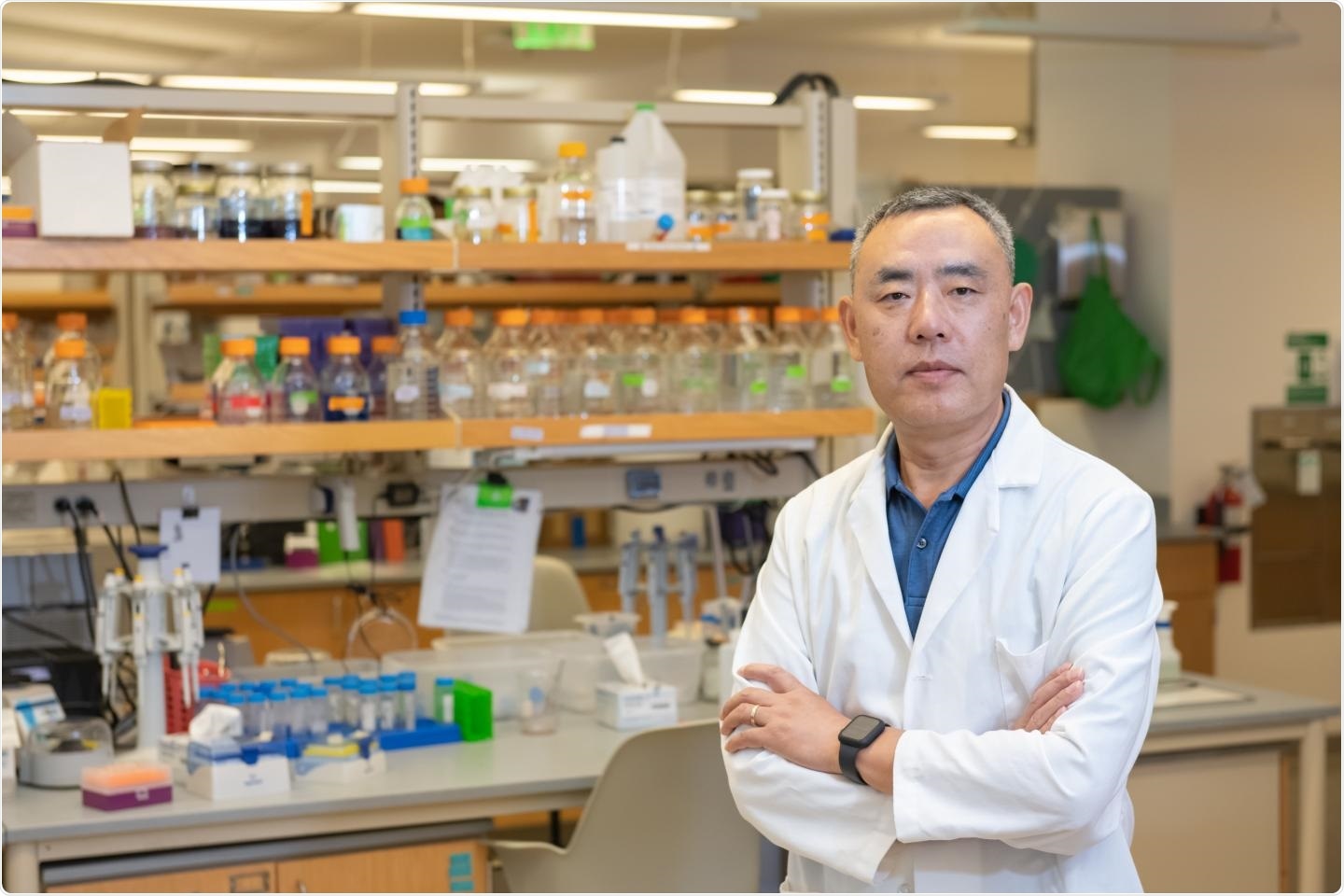
Clemson University biological sciences professor Yanzhang (Charlie) Wei has developed a bifunctional protein that bridges the human body's natural killer cells and breast cancer tumor cells. Image Credit: Clemson University.
Natural killers are a part of the human immune system and their main targets are breast cancer tumor cells. In this case, the triggers are fusion proteins designed by researchers from Clemson University and these proteins connect the two together.
It's an innovative method for designing breast cancer immunotherapy that may lead to new treatment choices for the most common cancer in the world.
In the United States, about one in every eight women and one in every 1,000 males will develop invasive breast cancer during their lifetime. In the United States, breast cancer is the second largest cause of cancer mortality in women, only after lung cancer. According to the American Cancer Society, about 43,600 women in the United States will die from cancer in 2021. Immunotherapy uses the power of the body’s immune system to destroy cancer cells.
Very simply, cancer is uncontrolled cell growth. Some cells will become abnormal and have the potential to become cancer. The immune system can recognize these abnormal cells and destroy them before they become cancer cells. Unfortunately for those who develop cancer, the immune system is not working very well because of gene mutations and environmental factors. The result is that the cancer cells won the fight between the immune system and the tumors.”
Yanzhang (Charlie) Wei, Professor, Department of Biological Sciences, College of Science, Clemson University
The majority of breast cancer treatments focus on one of the three receptors: progesterone receptors, estrogen receptors, or epidermal growth factor receptors. But these receptors are not expressed in up to 20% of breast tumors. Such types of cancer are referred to as triple-negative breast cancer. And because of its high metastatic frequency, high heterogeneity, early relapse after conventional chemotherapy, and lack of effective treatment choices, triple-negative breast cancer is the most deadly subtype of breast cancer.
In the new study, Wei and his colleagues focused on prolactin receptors. Prolactin, a naturally occurring hormone in the body, contributes to breast development and milk production during nursing. Prolactin receptors are overexpressed in breast cancer cells.
When people are diagnosed with breast cancer, and it's called triple-negative, it is not good news. This has the potential to give patients another option.”
Yanzhang (Charlie) Wei, Professor, Department of Biological Sciences, College of Science, Clemson University
Prolactin receptors are expressed by more than 90% of breast cancer cells, including triple-negative breast cancer cells.
Wei and his research team created a bifunctional protein. One part of this protein is a mutant form of prolactin that can still adhere to the prolactin receptor but inhibits signal transduction that would encourage the development of tumors. The other part is an extracellular domain of key histocompatibility complex class I chain-related protein (MICA). When MICA attaches to the prolactin receptor, the natural killer cells are activated.
“One of the things tumor cells do is to inhibit natural killer cell activation, so we use these artificial bifunctional proteins to connect natural killer cells and activate them to enhance the killing of the breast cancer cells without increased cytotoxicity,” added Wei.
Wei is currently looking for funding to do animal model research to corroborate the findings.
One major question is whether the bifunctional protein would attract natural killer cells to healthy cells in the body that also express prolactin receptors and destroy them as well, resulting in severe side effects. If the animal model tests become successful, the promising new therapy would be tested in humans.
“If we had the funding now and everything is what we expected in the animal model study, we could be in clinical trials in five or six years,” added Wei.
Wei believes that since the protein developed by the Clemson University team uses human natural killer cells and breast cancer cells, the transition from in-vitro and animal studies to clinical trials will be easier for this promising immunotherapy than for others in the past.
Wei is no stranger to the development of novel immunotherapies for cancer. His studies integrating tumor cells with dendritic cells, an essential component of the body’s adaptive immune system, resulted in a dendritoma vaccine that was effective in patients with melanoma, neuroblastoma, and renal cell carcinoma. The vaccine has been patented and licensed to three biotech firms. Two firms are still working on vaccination therapy or similar treatments.
“It is my dream that someday we can create a group of these bifunctional proteins that could be used for other cancers by shifting the target molecule. We'd have the one part of the bifunctional protein that targets natural killer cells. The other part would target other cancer types that have unique markers,” concluded Wei.
Source:
Journal reference:
Ding, H., et al. (2021) MICA-G129R: A bifunctional fusion protein increases PRLR-positive breast cancer cell death in co-culture with natural killer cells. PLOS ONE. doi.org/10.1371/journal.pone.0252662.